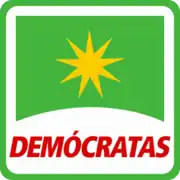Democrat Social Movement
The Democrat Social Movement (Spanish: Movimiento Demócrata Social; MDS),[6] often shortened to just the Democrats, is a Bolivian political party founded in 2013 by politicians associated with the centre-right of the country's political spectrum and the movement for greater autonomy for the eastern departments of the Media Luna.
Democrat Social Movement Movimiento Demócrata Social | |
|---|---|
 | |
| President | Ruben Costas Aguilera |
| Founded | December 15, 2013 |
| Preceded by | Popular Consensus |
| Headquarters | Cochabamba |
| Ideology | Liberal conservatism Federalism Regionalism[1] |
| Political position | Centre-right[2][3] |
| International affiliation | International Democrat Union[4] |
| Regional affiliation | Union of Latin American Parties[5] Christian Democrat Organization of America |
| Colours | Green, white, yellow |
| Chamber of Deputies | 0 / 130 |
| Senate | 0 / 36 |
| Website | |
| democratas | |
History
Ruben Costas, governor of Santa Cruz department, announced the party's formation in March 2013.[7] Twenty leaders gathered to launch the party in April 2013, including Costas, Beni governor Carmelo Lens and his predecessor Ernesto Suarez, Senator Bernard Gutierrez (PPB-Cochabamba), and Cochabamba council member Ninoska Lazarte. The launch was hosted by Savina Cuéllar, the former prefect of Chuquisaca Department, who as of April 2013, was under house arrest facing charges for the May 24, 2008, violence in Sucre.[8]
After a failed petition to legally merge the registration of Costas' Truth and Social Democracy (VERDES) party, Renewing Freedom and Democracy (Libertad y Democracia Renovadora; Líder), and Popular Consensus in June, the Supreme Electoral Tribunal authorized Popular Consensus to rename itself the Democrat Social Movement in August 2013.[9]
MDS participated in the 2014 election in alliance with the National Unity Front (UN), supporting the presidential candidacy of Samuel Doria Medina, electing 4 Deputies and one senator. In the 2019 election, MDS broke its alliance with Unidad Nacional and supported the presidential candidacy of Oscar Ortiz, while UN supported Carlos Mesa.
Party member and opposition Senator Jeanine Áñez became interim president of Bolivia in November 2019, following the Evo Morales government resignation. This move was contested by senators for the Movement for Socialism (MAS), Morales's party, who were majority in the assembly and were not in attendance, and thus stated that the vote for interim president took place without a quorum.[10] However, the move was upheld by the Plurinational Constitutional Court, which stated that it followed the succession mechanism stated in the Constitution of Bolivia.[11][12]
References
- Lansford, Tom (ed.). Political Handbook of the World 2014. p. 156. ISBN 9781483386263.
- "Los temores de Evo". Correo del Sur. 22 November 2018.
- European Parliamentary Research Service (April 2015). "Bolivia: political parties" (PDF). European Parliamentary Research Service. p. 2. Retrieved 14 November 2019.
- https://www.idu.org/members/
- http://uplalatinoamerica.org/partidos-miembros/
- "TSE inscribe al Movimiento Demócratas". Los Tiempos. 28 August 2013. Archived from the original on 2013-12-03.
- Candori, Iván (29 March 2013). "Costas da forma a un nuevo partido". La Razón (in Spanish). Retrieved 24 November 2013.
- "Lanzan Movimiento Demócrata Social". Los Tiempos (in Spanish). Cochabamba, Bolivia. 25 April 2013. Archived from the original on 2 December 2013. Retrieved 24 November 2013.
- "TSE inscribe al Movimiento Demócratas". Los Tiempos (in Spanish). Cochabamba, Bolivia. 28 August 2013. Archived from the original on 3 December 2013. Retrieved 24 November 2013.
- Tuckman, Jo; Collyns, Dan (13 November 2019). "Bolivia: Jeanine Añez claims presidency after ousting of Evo Morales". The Guardian. La Paz. ISSN 0261-3077. Retrieved 13 November 2019.
- "Áñez asume la Presidencia de Bolivia ante vacancia y aplicando la sucesión constitucional" [Áñez assumes the Presidency of Bolivia due to vacancy and applying the constitutional succession]. El Deber (in Spanish). Retrieved 13 November 2019.
- "TCP avala sucesión constitucional en la Presidencia" [TCP endorses constitutional succession in the Presidency]. El Deber (in Spanish). Retrieved 13 November 2019.